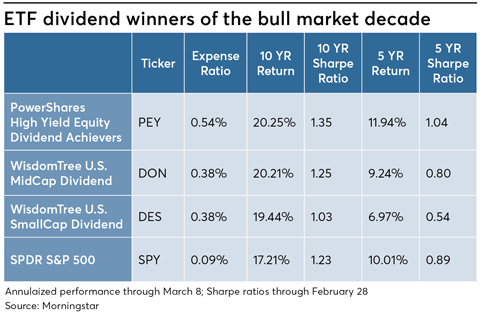
High dividend large cap stocks are a great way to increase your dividends. These companies are known for their high yield dividends and low P/E ratios. Their dividend yields average 3.4% or greater. Below are 7 such stocks, each with a P/E ratio of under 20 and a dividend yield of over three percent.
Microsoft
If you're looking for a large-cap growth stock that pays a healthy dividend, consider Microsoft. Microsoft has a history of dividend increases, and its earnings per share has grown at an average rate of 24% per year over the past five years. It also has a low payout percentage, which is a good thing for dividend stocks. In the future, it is expected that its dividend will increase by 10% per annum for five years.
Microsoft pays dividends three times per month and four times each year. The payment date for dividends varies each month. It usually falls within the first week of each month. This date is crucial for potential investors as they need to finish their investment BEFORE the ex dividend date.

Johnson & Johnson
If you're looking for a high dividend large cap stock, Johnson & Johnson is an excellent option. Johnson & Johnson offers a 2.4% dividend yield which is well above the S&P500 average. The company also boasts a strong brand and solid business model. It is also a leader in health care and shares appreciate every year. Another investment option is available if you want a stock with a rapid growth rate.
Johnson & Johnson has been bringing new products to the market in a steady manner. The company is now a leading player in a number health care categories. Today, the company has a market cap of $435billion, and it generates $98billion annually in revenue. This makes it a mega-cap stock (market cap over $200 billion). It recently released its second-quarter results. They exceeded analysts expectations. Its revenue increased by 3 percent year-overyear to $24Billion. Additionally, its adjusted EPS shot up from $2.59 and $2.68 respectively. This record-breaking achievement is no surprise.
Lowe's
Lowe's could be the stock you're looking for if you're an income investor who wants a stock that is strong and has a rich dividend history. The company is known for its dividend growth, low payout ratio and healthy earnings growth. Lowe's increased its payout 60 times in a row. The company can finance its dividend growth with low debt levels and can execute share purchase and invest in business to fuel future earnings.
Lowe's also offers a Stock Advantage Direct Stock purchase plan. This program allows new investors to purchase shares of Lowe's common stock and increases existing investors' holdings automatically. Participants also have the option of automatically reinvesting their dividends.

Target
Target is one of the most attractive large-cap retail stocks that dividend investors can choose from. The company's current market valuation is low, but its growth prospects are excellent. The company has consistently raised its dividend for the past 50 years and is expected to continue this trend in the future. Its profits have also grown significantly.
The company has a clear strategy. Target sells high-quality merchandise online at low prices. Target management believes its stores can give it an advantage over its competitors, such as Amazon and Walmart. It has also invested in supply chain logistics and renovated stores to increase efficiency.
FAQ
What is the role and function of the Securities and Exchange Commission
SEC regulates the securities exchanges and broker-dealers as well as investment companies involved in the distribution securities. It enforces federal securities laws.
What is the trading of securities?
Stock market: Investors buy shares of companies to make money. Investors can purchase shares of companies to raise capital. Investors can then sell these shares back at the company if they feel the company is worth something.
Supply and demand determine the price stocks trade on open markets. When there are fewer buyers than sellers, the price goes up; when there are more buyers than sellers, the prices go down.
Stocks can be traded in two ways.
-
Directly from company
-
Through a broker
Can bonds be traded?
The answer is yes, they are! As shares, bonds can also be traded on exchanges. They have been traded on exchanges for many years.
They are different in that you can't buy bonds directly from the issuer. You will need to go through a broker to purchase them.
This makes it easier to purchase bonds as there are fewer intermediaries. This also means that if you want to sell a bond, you must find someone willing to buy it from you.
There are several types of bonds. While some bonds pay interest at regular intervals, others do not.
Some pay interest every quarter, while some pay it annually. These differences allow bonds to be easily compared.
Bonds are very useful when investing money. You would get 0.75% interest annually if you invested PS10,000 in savings. You would earn 12.5% per annum if you put the same amount into a 10-year government bond.
If all of these investments were put into a portfolio, the total return would be greater if the bond investment was used.
What is security at the stock market and what does it mean?
Security is an asset that generates income for its owner. Most security comes in the form of shares in companies.
There are many types of securities that a company can issue, such as common stocks, preferred stocks and bonds.
The earnings per share (EPS), and the dividends paid by the company determine the value of a share.
When you buy a share, you own part of the business and have a claim on future profits. You will receive money from the business if it pays dividends.
You can sell shares at any moment.
What is the difference in a broker and financial advisor?
Brokers are people who specialize in helping individuals and businesses buy and sell stocks and other forms of securities. They take care all of the paperwork.
Financial advisors are experts on personal finances. They can help clients plan for retirement, prepare to handle emergencies, and set financial goals.
Banks, insurance companies or other institutions might employ financial advisors. They can also be independent, working as fee-only professionals.
It is a good idea to take courses in marketing, accounting and finance if your goal is to make a career out of the financial services industry. Also, you'll need to learn about different types of investments.
Statistics
- US resident who opens a new IBKR Pro individual or joint account receives a 0.25% rate reduction on margin loans. (nerdwallet.com)
- The S&P 500 has grown about 10.5% per year since its establishment in the 1920s. (investopedia.com)
- Ratchet down that 10% if you don't yet have a healthy emergency fund and 10% to 15% of your income funneled into a retirement savings account. (nerdwallet.com)
- Even if you find talent for trading stocks, allocating more than 10% of your portfolio to an individual stock can expose your savings to too much volatility. (nerdwallet.com)
External Links
How To
How to open an account for trading
To open a brokerage bank account, the first step is to register. There are many brokers available, each offering different services. There are many brokers that charge fees and others that don't. Etrade (TD Ameritrade), Fidelity Schwab, Scottrade and Interactive Brokers are the most popular brokerages.
Once your account has been opened, you will need to choose which type of account to open. These are the options you should choose:
-
Individual Retirement accounts (IRAs)
-
Roth Individual Retirement Accounts (RIRAs)
-
401(k)s
-
403(b)s
-
SIMPLE IRAs
-
SEP IRAs
-
SIMPLE SIMPLE401(k)s
Each option has its own benefits. IRA accounts provide tax advantages, however they are more complex than other options. Roth IRAs are a way for investors to deduct their contributions from their taxable income. However they cannot be used as a source or funds for withdrawals. SIMPLE IRAs can be funded with employer matching funds. SEP IRAs work in the same way as SIMPLE IRAs. SIMPLE IRAs are simple to set-up and very easy to use. They enable employees to contribute before taxes and allow employers to match their contributions.
The final step is to decide how much money you wish to invest. This is known as your initial deposit. Most brokers will give you a range of deposits based on your desired return. Based on your desired return, you could receive between $5,000 and $10,000. This range includes a conservative approach and a risky one.
After you've decided which type of account you want you will need to choose how much money to invest. Each broker sets minimum amounts you can invest. The minimum amounts you must invest vary among brokers. Make sure to check with each broker.
After deciding the type of account and the amount of money you want to invest, you must select a broker. Before choosing a broker, you should consider these factors:
-
Fees-Ensure that fees are transparent and reasonable. Many brokers will offer rebates or free trades as a way to hide their fees. However, some brokers charge more for your first trade. Be wary of any broker who tries to trick you into paying extra fees.
-
Customer service – Look for customer service representatives that are knowledgeable about the products they sell and can answer your questions quickly.
-
Security - Make sure you choose a broker that offers security features such multi-signature technology, two-factor authentication, and other.
-
Mobile apps: Check to see whether the broker offers mobile applications that allow you access your portfolio via your smartphone.
-
Social media presence - Check to see if they have a active social media account. It may be time to move on if they don’t.
-
Technology – Does the broker use cutting edge technology? Is the trading platform intuitive? Are there any glitches when using the system?
Once you have decided on a broker, it is time to open an account. Some brokers offer free trials, while others charge a small fee to get started. After signing up, you will need to confirm email address, phone number and password. Then, you'll be asked to provide personal information such as your name, date of birth, and social security number. Finally, you'll have to verify your identity by providing proof of identification.
Once verified, your new brokerage firm will begin sending you emails. These emails contain important information about you account and it is important that you carefully read them. The emails will tell you which assets you are allowed to buy or sell, the types and associated fees. Track any special promotions your broker sends. You might be eligible for contests, referral bonuses, or even free trades.
Next, you will need to open an account online. Opening an account online is normally done via a third-party website, such as TradeStation. Both of these websites are great for beginners. To open an account, you will typically need to give your full name and address. You may also need to include your phone number, email address, and telephone number. After you submit this information, you will receive an activation code. This code is used to log into your account and complete this process.
You can now start investing once you have opened an account!